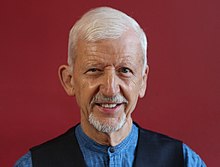Theravāda is the most commonly accepted name of Buddhism's oldest existing school. The school's adherents, termed Theravādins, have preserved their version of Gautama Buddha's teaching or dhamma in the Pāli Canon for over two millennia.
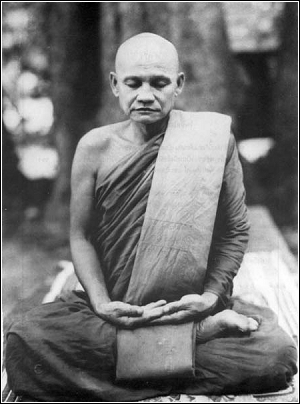
Ajahn Chah was a Thai Buddhist monk. He was an influential teacher of the Buddhadhamma and a founder of two major monasteries in the Thai Forest Tradition.
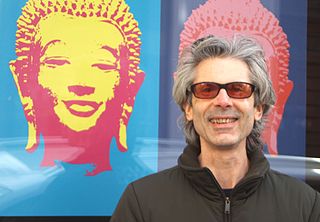
Mark Epstein is an American author and psychotherapist who integrates Shakyamuni Buddha's teachings with Sigmund Freud's approaches to trauma. He often writes about the interface of Buddhism and psychotherapy.
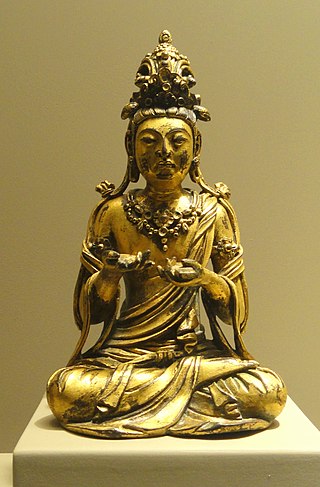
Prajñā or paññā is a Buddhist term often translated as "wisdom", "insight", "intelligence", or "understanding". It is described in Buddhist texts as the understanding of the true nature of phenomena. In the context of Buddhist meditation, it is the ability to understand the three characteristics of all things: anicca ("impermanence"), dukkha, and anattā. Mahāyāna texts describe it as the understanding of śūnyatā ("emptiness"). It is part of the Threefold Training in Buddhism, and is one of the ten pāramīs of Theravāda Buddhism and one of the six Mahāyāna pāramitās.
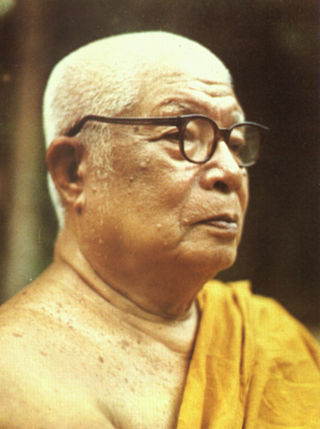
Buddhadasa was a Thai Buddhist monk. Known as an innovative reinterpreter of Buddhist doctrine and Thai folk beliefs, he fostered a reformation in conventional religious perceptions in his home country, Thailand, as well as abroad. He developed a personal view that those who have penetrated the essential nature of religions consider "all religions to be inwardly the same", while those who have the highest understanding of dhamma feel "there is no religion".
The Vipassanā movement, also called the Insight Meditation Movement and American Vipassana movement, refers to a branch of modern Burmese Theravāda Buddhism that promotes "bare insight" (sukha-Vipassana) to attain stream entry and preserve the Buddhist teachings, which gained widespread popularity since the 1950s, and to its western derivatives which have been popularised since the 1970s, giving rise to the more dhyana-oriented mindfulness movement.

Abhayagiri is a Theravadin Buddhist monastery of the Thai Forest Tradition in Redwood Valley, California. Its chief priorities are the teaching of Buddhist ethics, together with traditional concentration and insight meditation, as an effective way of completely uprooting suffering and discontent. Abhayagiri means 'fearless mountain' in the Pali language.

The Kammaṭṭhāna Forest Tradition of Thailand, commonly known in the West as the Thai Forest Tradition, is a lineage of Theravada Buddhist monasticism.

Amaravati is a Theravada Buddhist monastery at the eastern end of the Chiltern Hills in South East England. Established in 1984 by Ajahn Sumedho as an extension of Chithurst Buddhist Monastery, the monastery has its roots in the Thai Forest Tradition. It takes inspiration from the teachings of the community's founder, the late Ajahn Chah. Its chief priorities are the training and support of a resident monastic community, and the facilitation for monastic and lay people alike of the practice of the Buddha's teachings.
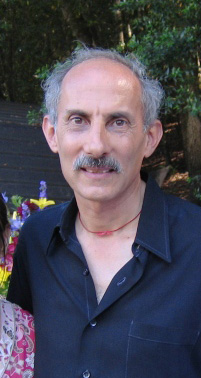
Jack Kornfield is an American writer and teacher in the Vipassana movement in American Theravada Buddhism. He trained as a Buddhist monk in Thailand, Burma and India, first as a student of the Thai forest master Ajahn Chah and Mahasi Sayadaw of Burma. He has taught mindfulness meditation worldwide since 1974. In 1975, he co-founded the Insight Meditation Society in Barre, Massachusetts, with Sharon Salzberg and Joseph Goldstein, and subsequently in 1987, Spirit Rock Meditation Center in Woodacre, California. Kornfield has worked as a peacemaker and activist, organized teacher training, and led international gatherings of Buddhist teachers including the Dalai Lama.
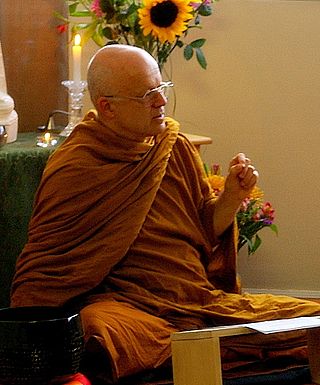
Ṭhānissaro Bhikkhu is an American Buddhist monk and author. Belonging to the Thai Forest Tradition, he studied for ten years under the forest master Ajahn Fuang Jotiko. Since 1993, he has served as abbot of the Metta Forest Monastery in San Diego County, California—the first monastery in the Thai Forest Tradition in the U.S.—which he cofounded with Ajahn Suwat Suvaco.
Gil Fronsdal is a Norwegian-born, American Buddhist teacher, writer and scholar based in Redwood City, California. He has been practicing Buddhism of the Sōtō Zen and Vipassanā sects since 1975, and is currently teaching the practice of Buddhism in the San Francisco Bay Area. Having been taught by the Vipassanā practitioner Jack Kornfield, Fronsdal is part of the Vipassanā teachers' collective at Spirit Rock Meditation Center. He was ordained as a Sōtō Zen priest at the San Francisco Zen Center in 1982, and was a Theravāda monk in Burma in 1985. In 1995, he received Dharma transmission from Mel Weitsman, the abbot of the Berkeley Zen Center.
Joseph Goldstein is one of the first American vipassana teachers, co-founder of the Insight Meditation Society (IMS) with Jack Kornfield and Sharon Salzberg, a contemporary author of numerous popular books on Buddhism, a resident guiding teacher at IMS, and a leader of retreats worldwide on insight (vipassana) and lovingkindness (metta) meditation.

Dhammakaya meditation is a method of Buddhist Meditation developed and taught by the Thai meditation teacher Luang Pu Sodh Candasaro (1885–1959). In Thailand, it is known as Vijjā dhammakāya, which translates as 'knowledge of the dhamma-body'. The Dhammakāya Meditation method is considered one of the most prominent in Thailand and other parts of Southeast Asia. It has been described as a revival of both "samatha" (tranquility) and "vipassanā" (insight) meditation practices in Thailand.
Aruna Ratanagiri Buddhist Monastery is a Theravada Buddhist monastery of the Thai Forest Tradition in Northumberland, England. The community consists of monks, novices and postulants from a wide range of nationalities, usually numbering around eight Sangha members. The monastery includes an adjacent lay retreat facility known as Kusala House.

Bhikkhu Anālayo is a bhikkhu, scholar, and meditation teacher. He was born in Germany in 1962, and went forth in 1995 in the Theravādin monastic tradition of Sri Lanka. He is best known for his comparative studies of Early Buddhist Texts as preserved by the various early Buddhist traditions.

Ajahn Pasanno is the most senior Western disciple of Ven. Ajahn Chah in the United States, and most senior in the world after Ajahn Sumedho and Ajahn Khemadhammo. For many years he was the abbot of Wat Pah Nanachat International Forest Monastery in Northeast Thailand. In the late 1990s, Ajahn Pasanno moved to California to head the new Abhayagiri Monastery. With more than 40 years as a bhikkhu, Ajahn Pasanno has been instrumental in training many monks in Thailand and the United States and has been supportive of training for women.

Stephen Fulder is the founder and senior teacher of the Israel Insight Society (Tovana), the major organisation in Israel teaching Buddhist meditative practice. He has worked since 1975 in the field of herbal and complementary medicine as an author, consultant and researcher, publishing many books and research papers. His latest book is: "What's Beyond Mindfulness: Waking Up to This Precious Life".

Ajahn Fuang Jotiko was a Thai Buddhist monk and abbot in the Thai Forest Tradition of Theravada Buddhism.

Suan Mokkhaphalaram, known as Suan Mokkh for short, is a Theravada Buddhist monastery, retreat and meditation center in Amphoe Chaiya, Surat Thani, Thailand. It was founded in 1932 by the monk, religious teacher, and social reformer Buddhadasa Bhikkhu, who was a representative and pioneer of Engaged Buddhism.
